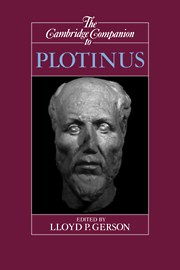Book contents
- Frontmatter
- Introduction
- 1 Plotinus
- 2 Plotinus's metaphysics of the One
- 3 The hierarchical ordering of reality in Plotinus
- 4 On soul and intellect
- 5 Essence and existence in the Enneads
- 6 Plotinus on the nature of physical reality
- 7 Plotinus on matter and evil
- 8 Eternity and time
- 9 Cognition and its object
- 10 Self-knowledge and subjectivity in the Enneads
- 11 Plotinus
- 12 Human freedom in the thought of Plotinus
- 13 An ethic for the late antique sage
- 14 Plotinus and language
- 15 Plotinus and later Platonic philosophers on the causality of the First Principle
- 16 Plotinus and Christian philosophy
- Bibliography
- Index
10 - Self-knowledge and subjectivity in the Enneads
Published online by Cambridge University Press: 28 May 2006
- Frontmatter
- Introduction
- 1 Plotinus
- 2 Plotinus's metaphysics of the One
- 3 The hierarchical ordering of reality in Plotinus
- 4 On soul and intellect
- 5 Essence and existence in the Enneads
- 6 Plotinus on the nature of physical reality
- 7 Plotinus on matter and evil
- 8 Eternity and time
- 9 Cognition and its object
- 10 Self-knowledge and subjectivity in the Enneads
- 11 Plotinus
- 12 Human freedom in the thought of Plotinus
- 13 An ethic for the late antique sage
- 14 Plotinus and language
- 15 Plotinus and later Platonic philosophers on the causality of the First Principle
- 16 Plotinus and Christian philosophy
- Bibliography
- Index
Summary
Plotinus anticipates Descartes in arguing both that the soul as subject of perception cannot be an extended substance, as well as in arguing that the mind necessarily knows itself. Like Descartes, Plotinus also invokes an introspective or subjective stance within his dialectical procedure. Methodologically, it will be seen, Plotinus shares along with Descartes in a tradition of philosophy of mind that employs thought experiments as a method of persuasion. The special nature of this persuasion is effected through the textual representation of a highly structured subjectivity as if it were immediately available within the reader's own consciousness.
In this chapter, I will be looking at what might be called a Cartesian method of self-representation, that is, at the philosophical appeal to subjective states, and asking whether and how it informs the contemplative pedagogy of Plotinus. In particular, I will concentrate upon Plotinus's use of thought experiments, in order to discuss his views about self-consciousness and subjectivity.
SUBJECTIVITY AND SELF-CONSCIOUSNESS
What does it mean to for someone to be a person-what is the essence of the human self? In the modern, Cartesian tradition, one answer to this question is that the self is the mind, whereas the mind in its turn is a substance uniquely endowed with both reflexive consciousness and with subjectivity. Recently, historicist challenges to this mentalistic conception of personhood have argued that the ancient Greek philosophers managed their psychology and epistemology quite well without the concept of consciousness.
- Type
- Chapter
- Information
- The Cambridge Companion to Plotinus , pp. 250 - 274Publisher: Cambridge University PressPrint publication year: 1996
- 16
- Cited by

